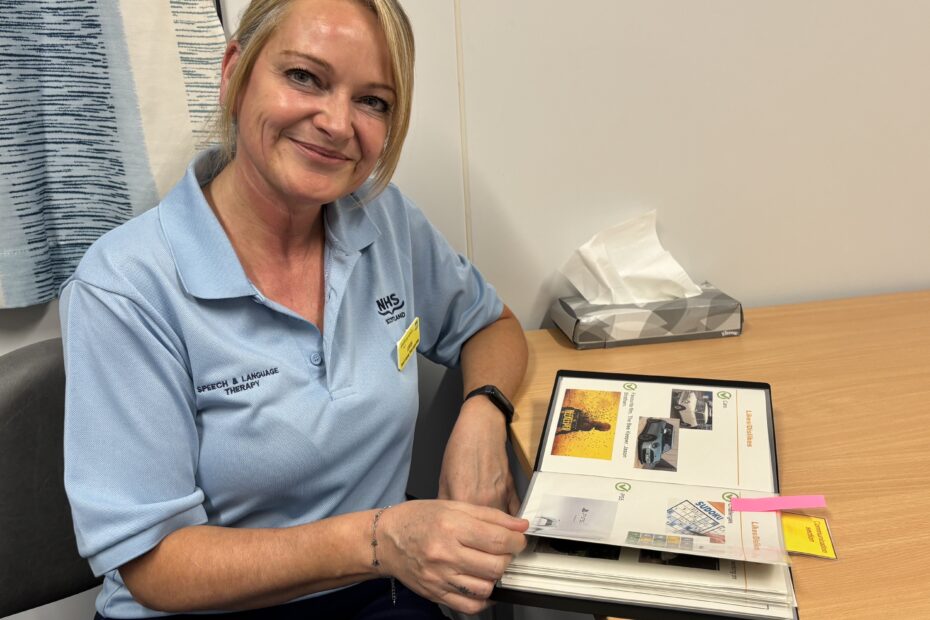Dementia patients and those who struggle to communicate after a stroke have been supported to create autobiographical ‘life story’ books.
The books act as a fact file with details of a person’s background, interests and the people and things that are important to them.
They can help people to feel more connected to their family members by sparking memories and prompting conversations and can aid stroke patients’ rehabilitation.
The life stories, which are produced by NHS Greater Glasgow and Clyde’s Speech and Language Therapy (SLT) service, can also be particularly valuable for health and care workers to get to know the person they are supporting in hospital, at home, or in a care home.
Leigh McKnight, a healthcare support worker with the SLT service at Paisley’s Royal Alexandra Hospital, has helped hundreds of patients and their families put together books which can help them cope with the devastating diagnosis of Alzheimer’s disease or dementia.
She also works with stroke patients experiencing aphasia, and people who have suffered brain injuries and are unable to communicate the way they used to.
She told how patients’ families help by filling out a questionnaire about their loved one and providing materials such as photographs and life highlights.
Information gathered includes their likes and dislikes, key people in their lives, places they’ve travelled, hobbies and even how they take their tea or coffee.
Leigh then takes the information and places them in chronological order of their life, with relatives being able to continue adding to them. The patients themselves can also contribute at earlier stages of their illness.
Speech and Language Therapists, including Leigh’s RAH colleague Geraldine Ralph, identify patients who they think might benefit from having a book and then refer them to support workers.
As well as at the RAH, the life story book service is provided by a number of SLT healthcare support workers at sites across NHS Greater Glasgow and Clyde.
The wife of one patient with early onset dementia said the books give “a flavour of the person and their life” prior to their diagnosis.
She said: “As a loving wife and full time carer I have strived to make sure people see the person and recognise and understand that he deserves to be treated with respect, compassion and dignity.
“The life story book has really come into its own as he is in hospital and currently hasn’t been able to communicate.”
A patient with word-finding difficulties due to language-led dementia said: “It saves me embarrassment when I can’t think of a name because it’s there in my book and it takes the pressure off.”
And the relative of another patient said her loved one responds better to familiar visual prompts, rather than oral, adding: “When he comes to Speech and Language we feel we are seen as individuals – not just a case history.
“What a difference it makes to talk about what he can do rather than what he can’t.”
Leigh explained that the books can be used by hospital staff to get to know the patient they are caring for, and they can then be taken home or to a care home to help carers understand the person better, enabling them to deliver better, person-centred care.
She said: “A diagnosis of dementia or aphasia can be devastating for the person and their family.
“The feedback we’ve had about our life story books is hugely positive, and we know they bring a lot of comfort to those affected by impaired communication.
“Often they can be used to encourage conversations or discussions about certain topics or memories – this can really help people feel less isolated, and better understood.
“They also help health and social care staff understand the person they are caring for as they act as a fact file of their life and interests.
“I find it a very rewarding process and it’s great to see so many families take the books home and continue adding to them.”
In one example, Leigh used maps to illustrate all of the countries a patient had visited, and in another she included the lyrics to the song “Singing in the Rain” which the patient with dementia was still able to recite in full.
Other books include people’s favourite foods, music they enjoy, the football team they support and notes on how much physical activity they are capable of.
Every personalised story starts from the person’s birth, and goes on to include photos of their spouse and children, and key dates such as wedding anniversaries and the dates their children were born.
Leigh was recently nominated in the Employee of the Year category at NHS Greater Glasgow and Clyde’s local Clyde Sector Awards, where she received a certificate indicating her work is highly commended.
Speech and Language Therapist Geraldine said: “Leigh has a particular talent in making these life story books bright, colourful and engaging.
“She pays close attention to detail to individualise each book.
“This makes them entirely person-centred and they are very meaningful and appealing for service users to access.
“The feedback we’ve had about these books is incredibly positive and it means a lot to know the difference they have made to patients’ lives, and the comfort they’ve helped to bring their families.”

